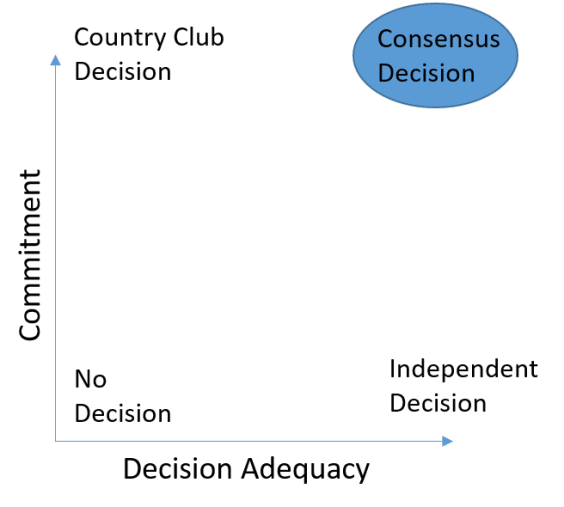Every Decision Is Not a Consensus Building Exercise
(Editor’s Note: Today’s post is brought to you by ITM Group, Inc., a consulting firm focused on training solutions that will help engage and retain employees. ITM Group has been named one of the top small businesses in South Florida. Check out their white paper “3 Ways to Tell if Your Company needs Leadership Training.” Enjoy the post!)
Every day we have to make decisions. Both on an individual level as well as part of a group or team. Some of the decisions we make are so trivial that we don’t even focus on them like “should I hit the snooze button one more time” or “red or white wine with dinner”. But others are much more serious and it’s those serious decisions that tell others about our ability to be a manager and leader.
There are two components to decision making. The first is decision adequacy, meaning how good the decision is. The other is commitment, referring to the number of people who support the decision. The thing to keep in mind is, when it comes to decision making, a high degree of one does not translate into a high degree of the other. We can have great decisions that no one supports and bad decisions that everyone supports.
Also found within the decision making dynamic is the way each of us as individuals reach “the decision.” People fall into four categories:
Individual #1 – Those who make decisions too quickly. These people want the decision “done and over with” so they can move on to something else. You know who those people are: they’re the ones that interview one person and decide to hire them just so they can say they’ve got an employee. They’re also the ones that decide to fire someone before they hear the other side of the story. For us HR Pros, we’re constantly reeling them in or playing ‘devil’s advocate’ to make sure they’ve considered everything before they run off and do something they might later regret.
Individual #2 – By contrast, these are the people who don’t make decisions at all. This type of person can actually cause the most harm to your organization. They believe that, by not making a decision, nothing can go wrong. EPIC FAIL. People who hold out making a decision hoping for that one additional piece of information to hit them over the head and tell them exactly what to do are creating a bigger problem. They stop the organization from functioning. It’s impossible to agonize over every little tidbit to make sure each piece is considered equally in the thought process. The reality is, with most decisions, we might never get all the information.
Individual #3 – Those who turn individual decisions into group decisions (aka country club decision making.) Don’t get me wrong. I’m all for teamwork and building consensus but, truth be told…some decisions need to be made by one person (and only one person.) It’s important to know what decisions can and should be made by individuals and which ones need team input. We’ve all seen what happens when a leader turns to the group to make a decision they should have made on their own…that’s how nightmare meetings are born.
Obviously Individual #4 is the person who can filter through the information and make the right call based upon the whole story. That’s the art of decision making – knowing who needs to make the decision, how much authority they have, and what information needs to be considered.
In order to be effective both as an individual and in a team environment, we should be a blend of all styles. For example, we should make decisions quickly during times of crisis. We should demonstrate independent thought as well as ask for team feedback at the proper moments. And, whenever possible, we should hold off making decisions until we believe all the information is on the table.
Organizations should not feel guilty if every decision isn’t a consensus building activity. It’s not supposed to be. Consensus building activities should be reserved for those times when having both a high level of decision adequacy and a high level of commitment are critical for success.
0